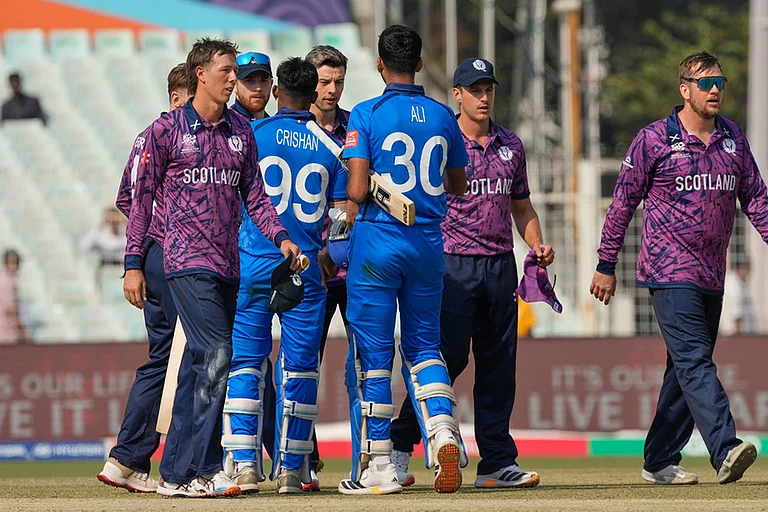Too many questions about Kashmir begin with a What If? Heres another. What if thePakistani population of more than half-a-million were wiped off Britains records andreplaced almost entirely by a Kashmiri population?
This is not a hypothetical question. The separatist claim that Kashmiris in Britain areKashmiris and not Indians or Pakistanis has emerged from its quiet beginnings into a loudand open revolt. And the Pakistanis are worried.
Last week the move was formally launched at a meeting in the House of Commons, by MPMarsha Singh, as the Kashmir National Identity Campaign. A resolution floated by Singhreceived signatures from 15 British MPs. Its aim is quite simple: in two years allKashmiris in Britain should be recorded in the new census as Kashmiris, not as Pakistanisor Indians. Presently the British minority recorded as Pakistani is almost entirelyKashmiri.
The Bradford city council already records Kashmiris as a separate ethnic minority. Sodo the councils in Luton and Pendle. Birmingham is likely to be next. And so, Bradford isno longer that Pakistani town in Britain, but that Kashmiri town in Britain. Andoverwhelming numbers of Bradford and Luton "Pakistanis" have begun to recordthemselves as Kashmiris. Whereas the Indian Kashmiri population of Britain is no more thana couple of hundred families or so.
The separation of declared identity has received strong political support. Leaders ofalmost all the separatist Kashmiri groups in Britain attended the meeting to back the newcampaign, among them the various groups of the Jammu Kashmir Liberation Front, the JammuKashmir Peoples National Party, and the Kashmir International Front.
Syed Hussain, the movements leader, has set up 20 committees in different partsof Britain with plans in effect to convert Pakistanis in Britain to Kashmiris.He says that other Pakistanis in Britain have been "very sympathetic", addingthat the "voices of concern" have come from "governments andinstitutions". A senior member of the Pakistan Peoples Party who is supportingthis campaign, said this was putting it mildly. "The fact of the matter is that thePakistani high commission is frantic, they are feeling betrayed."
In defence of their position, Hussain and other leaders tell the story of a Bradfordcouncillor, Mir Shafi, who died last year. "The family members were told he could berecorded in the death certificate as only Indian or Pakistani, not as Kashmiri,"Hussain said. "We were all very upset because he had lived and struggled all his lifeas a Kashmiri."
Kashmiris also see material advantages in the possible identity separation: officialrepresentation in jobs, housing and other benefits. "As half-a-million Kashmiris weare the largest ethnic group in Britain after the Irish," says Hussain. "Wedeserve to have our own category."
Just as the campaign seeks to disconnect Kashmiris from their Pakistani identity, italso aims to disconnect Kashmiris in Britain from Kashmiris on the subcontinent. "Weare British Kashmiris," says Hussain. "We do not live in the South Asiapolitical context."
"The Pakistanis are telling us we are traitors, just as it is between Indians andseparatist Kashmiris," says Afzal Tahir from the Kashmir International Front. Hebelieves that the new separation is far more political than economic. "We are calledKashmiri but used as Pakistanis," he says. "Kashmiris are being used againsttheir own interests and they have begun to realise that."
This is a further worry for the Pakistani establishment. Tahir told Outlook,"Once Kashmiris no longer have Pakistani passports, Pakistan will lose its biggestand most important constituency outside Pakistan."
The implication here is that the campaign could develop into opposition to Pakistanioccupation of a part of Kashmir. Says Tahir,"There will be many among us who willstruggle for the rights of Kashmiris both in India and in Pakistan. We have an interest inspeaking for Kashmiris and this will help us in our struggle for freedom fromPakistan."
The Lahore summit has spurred the separatist Kashmiri movement inBritain to speed up its campaign, driven by fears that an understanding between India andPakistan might lead to a mutual agreement to restrict its activities. The Pakistanigovernment must be reflecting on the irony of the situation, as it is increasinglytargeted by a cause that it has so often championed.

























